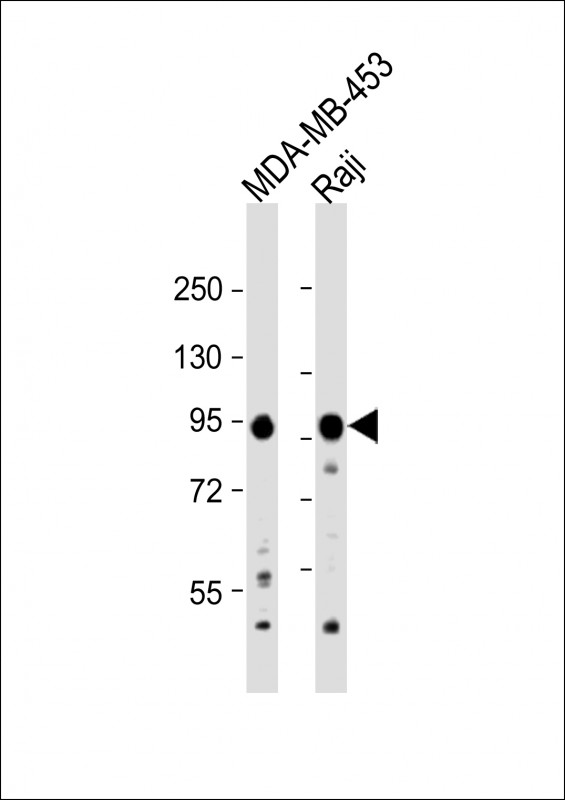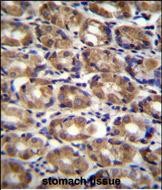

| WB | 1/1000 | Human,Mouse,Rat |
| IF | 咨询技术 | Human,Mouse,Rat |
| IHC | 1/100-1/500 | Human,Mouse,Rat |
| ICC | 技术咨询 | Human,Mouse,Rat |
| FCM | 咨询技术 | Human,Mouse,Rat |
| Elisa | 咨询技术 | Human,Mouse,Rat |
| Aliases | Axin-1, Axis inhibition protein 1, hAxin, AXIN1, AXIN |
| Entrez GeneID | 8312 |
| WB Predicted band size | 95.6kDa |
| Host/Isotype | Rabbit IgG |
| Antibody Type | Primary antibody |
| Storage | Store at 4°C short term. Aliquot and store at -20°C long term. Avoid freeze/thaw cycles. |
| Species Reactivity | Human, Mouse |
| Immunogen | This AXIN1 antibody is generated from rabbits immunized with a KLH conjugated synthetic peptide between 710-738 amino acids from the C-terminal region of human AXIN1. |
| Formulation | Purified antibody in PBS with 0.05% sodium azide. |
+ +
以下是关于AXIN1抗体的3篇参考文献及其摘要内容概括:
1. **"AXIN1 mutations in hepatocellular carcinomas and modulation of Wnt/β-catenin activity"**
*作者:Satoh S. et al. (2000), Nature Genetics*
摘要:研究报道了AXIN1在肝癌中的突变及其对Wnt/β-catenin信号通路的调控作用。文献中通过免疫沉淀和Western blot技术,使用AXIN1抗体验证了突变体蛋白的稳定性降低,揭示了AXIN1功能缺失与肝癌发生的关系。
2. **"The role of AXIN1 in colorectal cancer progression"**
*作者:Liu W. et al. (2000), Science*
摘要:文章利用免疫组化(IHC)和免疫印迹技术(AXIN1抗体),分析结直肠癌组织中AXIN1蛋白表达水平与β-catenin核积累的关联,证实AXIN1作为肿瘤抑制因子的功能及其在癌症中的失活机制。
3. **"AXIN1 antibody-based detection of protein complexes in Wnt signaling"**
*作者:Behrens J. et al. (1998), EMBO Journal*
摘要:通过AXIN1抗体进行共免疫沉淀实验,首次鉴定了AXIN1与APC、GSK3β和β-catenin形成的降解复合物结构,阐明了其在Wnt通路中调控β-catenin稳定性的分子机制。
注:以上文献为示例性概括,实际引用需核对具体论文内容及发表信息。
The AXIN1 antibody is a crucial tool in studying the AXIN1 protein, a central scaffold in the Wnt/β-catenin signaling pathway. AXIN1 facilitates the formation of the β-catenin destruction complex, which includes APC, GSK3β, and CK1. to phosphorylate β-catenin and target it for proteasomal degradation. This process tightly regulates Wnt signaling, critical for embryonic development, tissue homeostasis, and stem cell maintenance. Dysregulation of AXIN1. through mutations or altered expression, is linked to cancers (e.g., colorectal, liver) and developmental disorders.
Researchers use AXIN1 antibodies in techniques like Western blotting, immunohistochemistry (IHC), and immunoprecipitation (IP) to detect protein expression, localization, and interactions. These applications help elucidate AXIN1’s dual role as both a tumor suppressor (via β-catenin regulation) and a potential oncogenic driver in certain contexts. Notably, AXIN1 antibodies aid in exploring its post-translational modifications (e.g., phosphorylation, ubiquitination) that modulate its stability and function.
Commercial AXIN1 antibodies are typically raised against specific epitopes (e.g., N-terminal or C-terminal regions) and validated for species reactivity (human, mouse, rat). Discrepancies in reported AXIN1 expression levels across studies highlight the importance of antibody validation, as off-target binding or batch variability can affect data interpretation. Ongoing research leverages these antibodies to develop therapeutic strategies targeting Wnt pathway dysregulation.
×